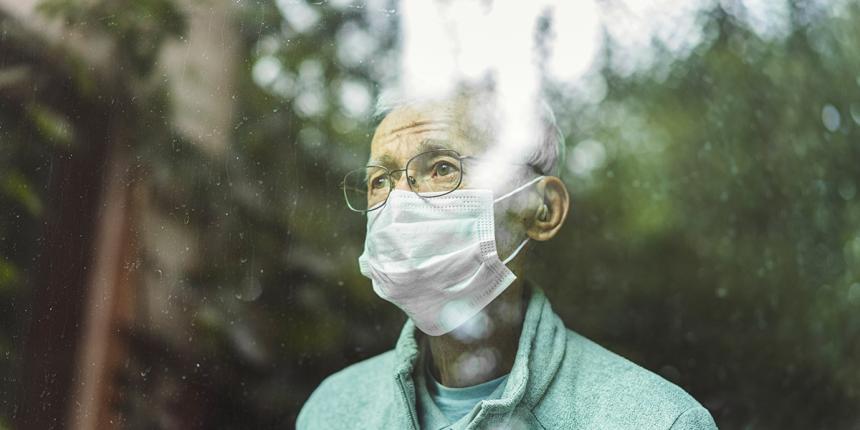How to Relieve Stress & Curb Depression During Covid

It’s hard to believe we’ve been living with COVID-19 for two years. For many, the constant grind, worrisome headlines, sacrifices and separation from loved ones has come at a heavy cost: Depression and anxiety have increased dramatically for Americans.
Study on Depression & Anxiety During the Pandemic
Studies published early in the pandemic found that symptoms of depression and anxiety had tripled among Americans during the pandemic. Unfortunately, those symptoms have persisted and gotten worse. A study published this month in the Lancet Regional Health – Americas, found the prevalence of depressive symptoms have increased over the course of the pandemic.
And while anxiety and depression have been constant companions during the pandemic, incidents are also closely correlated to the average number of daily COVID-19 cases, according to a third study published in October by the Centers for Disease Control and Prevention. As COVID cases rise, so do feelings of helplessness, sadness and stress. With COVID infections resurgent thanks to the Omicron variant, the studies suggest our moods are fluctuating with the data.
Tips for Managing Stress, Anxiety and Depression
While the pandemic may be triggering anxiety and depression, there are ways to manage and alleviate the symptoms. First, if you’re suffering clinical depression, you should see your MDVIP-affiliated physician or your primary care doctor first.
What does clinical depression look like?
Effects of Stress
- Persistent anxiety
- Loss of interest
- Hopeless outlook
- Fatigue
- Sleep issues
- Irritability (especially in men)
- Uncontrollable emotions are all symptoms.
Your doctor can help with tips, medication and even a referral to a counselor, therapist or another medical professional.
6 Tips to Help Manage Stress
If you’re feeling down, try these tips:
- Manage your stress. Stress can wreak havoc on your physical/mental health and steal your happiness. If you are stressed: take a yoga class, go for a long nature walk, meditate, watch a funny television show or engage in activities that help ease tension like cooking, knitting, dancing or socializing with friends.
- Get Moving. Exercise has been shown to reduce anxiety and depression and make both easier to manage. It helps maintain your overall health, sleep better and increase production of feel-good neurotransmitters referred to as endorphins, all of which contribute to a better mood. Sustained exercise can also produce growth factor proteins, which can help nerve cells grow and make new neurological connections. These biological changes also make you feel better.
- Eat healthier. In many ways, we are what we eat. Consistent diets that include fruit, vegetables, whole grain, fish, olive oil, low-fat dairy and antioxidants combined with limited consumption of animal foods are associated with lower levels of depression. Conversely, high-fat diets that include red and processed meats, refined grains, sweets and potatoes and lower intakes of fruits and veggies are associated with an increased risk of depression. Unfortunately, our tendency to eat consistently and healthfully go out the window when we’re stressed and depressed. But making good food choices can lead to healthier outcomes and better mental health.
- Avoid substances. Limit caffeine, as it causes jumpiness and irritability. And watch your alcohol intake. It’s okay to drink occasionally but relying on alcohol to take the edge off frequently can morph into a much bigger problem. A Harris survey released in September found that 17 percent of Americans over 21 were consuming heavy amounts of alcohol, an increase during the pandemic. Those who said they were drinking more also said they were experiencing negative mental, physical and psychosocial impacts.
- Practice selfcare. Indulge in activities that can help you lower your stress such as taking warm baths, getting massages and using aromatherapy. Essential oils can help ease mental health issues like stress, depression and anxiety. Lavender, cedarwood, frankincense, chamomile and grapefruit can be added to bath water, to massage oils and diffusers.
- Stay connected to others. If you’re social distancing, stay in contact with friends and loved ones via social media, texts/emails and telephone calls. Go for walks outside to see neighbors and feel involved in your neighborhood.
We don’t know when COVID will end or stop dominating our lives and news feeds. In fact, in a survey published last month and conducted before the Omicron variant became prevalent, most participants said they didn’t expect to have things return to normal for at least six more months. That’s a long time to continue living with feelings of anxiety and depression – especially if you’ve been experiencing the same emotions the last two years. But partnering with your doctor and taking steps to help yourself can make coping with the pandemic easier – and get you out of the COVID funk.
